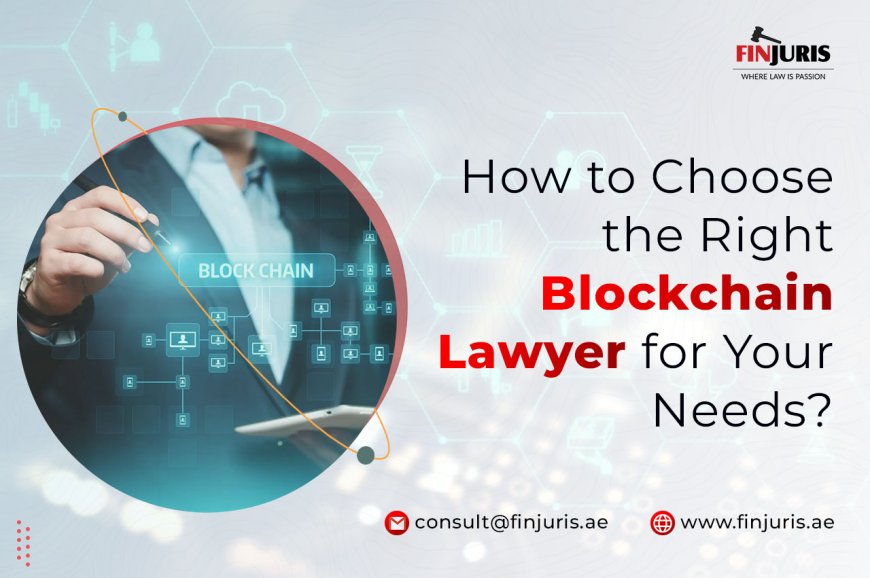How to Choose the Right Blockchain Lawyer for Your Needs?
Learn how to choose the right blockchain lawyer for your needs. Get expert tips on finding legal professionals specializing in blockchain technology and crypto law.

The blockchain economy is fast growing, resulting in an extensive legal framework. Whether you're a startup looking to launch a cryptocurrency project, a company hoping to incorporate blockchain technology, or an individual seeking legal advice, hiring the appropriate blockchain lawyer can make a big impact. Here's a complete guide on selecting the best blockchain lawyer for your needs, with a focus on crucial factors to consider.
Understanding the Role of the Blockchain Lawyer
Before delving into how to select the best lawyer, it's critical to understand the unique position that a blockchain legal performs. These legal experts focus on the legal and regulatory implications of blockchain technology, cryptocurrencies, and digital assets. They assist clients with matters such as compliance with securities laws, intellectual property rights, smart contracts, and data privacy requirements. Considering these areas might help you evaluate the level of skill required.
Assess Your Specific Needs
The first step in finding the best blockchain lawyer is to determine your exact legal requirements. Here are some questions to ponder.
What is the nature of your project? Are you launching a cryptocurrency, developing a decentralized application (DApp), or using blockchain into your current business?
What legal obstacles do you anticipate? Consider compliance with local and international rules, intellectual property rights, and contractual commitments.
What is your budget? Understanding your financial restrictions will assist you narrow down possible options.
Clarity on your needs can not only drive your search, but also allow you to interact successfully with possible lawyers.
Look for Relevant Experience
When evaluating potential blockchain lawyers, it is critical to evaluate their experience in the industry. Here are some variables to consider:
Industry Experience: Look for lawyers that have worked exclusively in the blockchain or cryptocurrency industries. Experience in this field will ensure that they are familiar with the specific issues and restrictions influencing your project.
Previous Cases: Inquire about their previous cases or clientele. A lawyer with prior experience in similar projects can provide essential insights and methods.
Ongoing Education: The blockchain space is always changing. A smart lawyer keeps up with the newest advancements in technology and policy, so ask about their continuing education and participation in industry events.
Evaluate Their Knowledge of Relevant Laws and Regulations
Blockchain technology connects with several areas of law, particularly securities regulation, intellectual property, and data privacy. As a result, it is critical to hire a lawyer who is well-versed in the applicable legal frameworks.
Securities Laws: If the venture involves raising funds through an Initial Coin Offering (ICO) or token sale, the lawyer should be knowledgeable about securities law to ensure compliance with local and international requirements.
Intellectual Property Rights: If you're producing exclusive technology, a knowledgeable intellectual property lawyer can assist you in protecting your discoveries with patents, trademarks, and copyright.
Data Privacy: Mastering data privacy standards is crucial, especially if your project handles personal data, as legislation such as GDPR in Europe and CCPA in California require it.
Assess Communication Skills
Effective communication is essential in any attorney-client relationship. You require a lawyer who can explain difficult legal topics in terms that you can grasp. Here's what you should consider:
Clarity and Responsiveness: Consider how quickly they answer to your inquiries and how well they communicate. This may reflect their dedication to your cause and ability to simplify complex issues.
Proactive Approach: A smart lawyer should not only respond to your queries, but also foresee prospective legal issues and advise you accordingly.
Tailored Advice: Rather than presenting generic answers, your lawyer should provide personalized legal advice based on your unique scenario.
Check for professional reputation and references.
A lawyer's reputation might have a big impact on your decision. Here are several ways to evaluate their standing in the industry:
Online Reviews and Testimonials: Use online platforms like legal directories to get reviews and ratings from past customers.
Bar Association Memberships: Determine whether they are members of relevant bar associations or groups focusing on blockchain law, as this might demonstrate their dedication to the topic.
Request References: Don't be afraid to ask prior clients for recommendations. Speaking with previous clients can provide valuable insight into their experience and satisfaction.
Consider Geographic Jurisdiction
Blockchain regulations varied significantly across jurisdictions. As a result, you must choose a lawyer who is conversant with the laws that apply to your business location.
Local Regulations: A lawyer situated in your jurisdiction will be more familiar with local rules and regulations governing blockchain technology and can assist you in navigating these complications.
International Perspective: If your project spans numerous jurisdictions, consider employing a lawyer with international experience or links to other legal professionals who can provide advice on foreign rules.
Evaluate Fee Structures
Legal fees can vary significantly, so understanding the fee structure is critical. Here are some factors to consider:
Ask about their charging practices, such as hourly rates, flat fees, or retainer payments. Understanding this can help you plan your budget more successfully.
Transparency: Look for a lawyer that is open about their fees and any other expenditures you may pay during the legal procedure.
Value for Money: While it may be tempting to go with the cheapest choice, remember that great legal representation can save you money in the long term by preventing legal difficulties from arising.
Schedule Initial Consultations
Many lawyers provide free introductory meetings, which can be an excellent way to assess their suitability for your needs. During the meeting, consider:
Discussing your project: Present your idea and legal problems to see how they respond and what insights they might offer.
Evaluating Compatibility: Use this opportunity to determine your level of comfort with the lawyer. Trust your intuition; a positive relationship can improve the efficiency of your legal partnership.
Assessing Their style: Take note of their problem-solving style and whether they appear to be really interested in your success.
Choosing the proper blockchain lawyer is an important step in ensuring the success of your project. You can make an informed decision by examining your individual requirements, evaluating appropriate experience, knowing applicable legislation, and taking into account communication and fee structures.
The proper legal partner will not only guide you through the complexities of blockchain law, but will also provide strategic advice that is aligned with your business objectives. Investing time and effort in selecting the proper lawyer can result in a smoother route forward, allowing you to concentrate on innovation and growth in the fascinating area of blockchain technology.
What's Your Reaction?




















